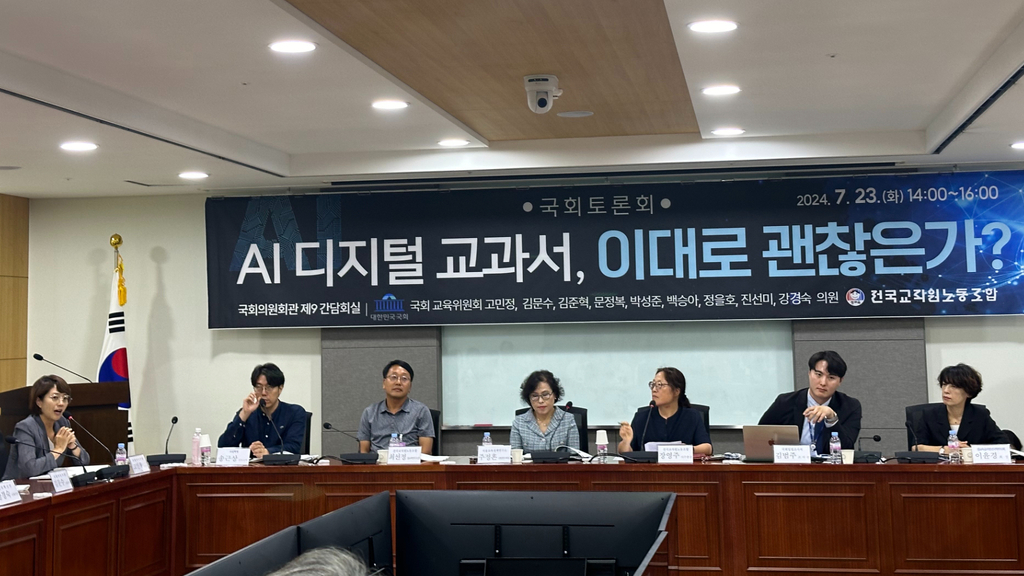일부 도입 후 2028년까지 전 과목 도입
서책형比 비용↑…교과용 예산 논의 필요
정부는 2025년 AI 디지털 교과서를 도입하겠다고 밝혔다. 그러나 업계 전문가들은 디지털 교육으로의 패러다임 전환에 우려의 목소리를 높이며 신중한 검토를 촉구하고 있다.
국회 교육위원회와 전국교직원노동조합은 국회의원회관에서 23일 ‘AI 디지털 교과서 이대로 괜찮은가?’ 토론회를 개최했다. 토론회에는 고민정 더불어민주당 국회의원, 주정흔 서울교육정책연구소 선임연구위원, 김범주 국회입법조사처 조사관, 송근상 교실혁명 선도교사, 이윤경 참교육을위한전국학부모회장, 김현주 교육부 교육콘텐츠정책과장, 송선진 교육부 디지털교육전환담당관, 박성임 개인정보보호위원회 개인정보보호정책과 사무관 등이 참석했다.
정부는 지난해 6월 ‘AI 디지털 교과서’를 내년 3월부터 초등 3,4학년과 중등 1학년, 고등 1학년을 대상으로 영어·수학·정보·국어(특수교육) 등 과목에 도입하겠다고 밝혔다. 이를 시작으로 2028년까지 국어, 사회, 과학, 역사 등 전 과목에 도입된다. AI 디지털 교과서는 SaaS(서비스형 소프트웨어)로 클라우드를 통해 제공한다고 밝힌 바 있다.
■ 세계 첫 AI 디지털 교과서 2025년 도입
‘AI 디지털 교과서’ 도입은 전 세계 최초로 논의된 사항이다. 학생 개개인 능력 및 수준에 따라 학습이 가능하도록 ‘AI 선생님’을 둔다는 것이 골자다. 디지털 교과서가 시행될 경우, 학생은 태블릿PC를 제공받아 학습을 진행한다. ‘AI 튜터’는 학습 능력, 태도 등을 분석해 준다.
일각에서는 AI 디지털 교과서가 시기상조라며 비판했다. 지난 5월 국민동의청원 사이트에는 학부모 및 교육계의 청원이 올라왔다. 청원의 내용은 스마트폰 및 디지털 기기 중독, 문해력 저하 등에 대한 우려다. 해당 청원은 5만 명 이상의 동의를 얻었다.
이날 더불어민주당 고민정 국회의원은 “내년 AI 디지털 교과서 도입은 교육 방식이나 기술 도입에 그치는 게 아닌, 교사-학생 관계나 교육 전반 패러다임 변화 등 ‘근본적 전환’을 가져온다는 측면에서 결코 단순히 볼 사안이 아니다”라고 주장했다.
전국교직원노동조합 전희영 위원장도 학생들의 △학습 이해력 저하 △의사소통 및 표현력 저하 △계층 및 지역 간 교육격차 심화 등의 문제점을 제기했다. 코로나19 장기화로 진행된 원격수업이 불러온 부정적 결과를 예시로 들었다.
주정흔 선임연구위원은 “AI 디지털 교과서는 사교육 가정학습용 목적으로 개발돼 수준의 정교함이 없어 개별 맞춤형 학습이라 보기 어렵다”며, “여전히 자기 주도성은 해결되지 않을 것으로 예상돼 유용성이 의심스럽다”고 말했다.
또한 AI 디지털 교과서로 수집한 학습데이터에 대한 의구심을 표했다. 주 선임연구위원은 “데이터가 서로 연결되는지, 어떻게 이해해야 하는지 알 수 없고, 학생 고유의 학습적 특징이 파악되기 어렵다”고 말했다. NICE 시스템과 연계돼 수집되는 데이터에서 학생의 민감 정도가 포함돼 사생활 보호에 대한 사회의 경각심이 부족하다는 점도 덧붙였다.
■ AI 디지털 교과서, 서책형보다 최대 10배 비싸
AI 디지털 교과서 가격(비용) 문제도 논란거리다. 구독형 모델이 적용되는 AI 교과서는 연 6~10만원에 달한다. 기존 서책형은 약 1만원 내외다.
AI 디지털 교과서는 공공이 제공하는 포털 서비스 및 민간이 제공하는 교과서 별 서비스 형태로 구성된다. AI 디지털 교과서를 찬성하는 편집사 및 개발사에 해당하는 교원, 네이버클라우드 등 기업 측은 학교별 사용 의무를 정부에 요구하고 있다.
교육부는 지난 3월 디지털교육혁신수요 특별교부금으로 5,333억 2,000만원을 전국 시도교육청에 납부했다고 밝혔다.
AI 디지털 교과서 검정심사 일정은 11월 중으로 완료되고, 이후 개발사·교육부·교육청 협상에 따라 권당 구독료가 결정된다. 교육감이 지방의회에 제출해야 하는 본 예산안에는 이를 반영할 수 없어 교과용 지원 예산 사용에 대한 논의와 대책이 강구된다는 분석이다.
한편 교육부는 2028년까지 서책형과 AI 디지털 교과서를 병행할 계획을 밝혔다. 이미 AI 제작 업체, 교과서 발행사들의 개발이 충분히 진행됐다는 판단이다.
AI 디지털 교과서가 도입될 경우를 고려할 때, 현장에서 실제 학생, 학부모, 교사가 기존과 차별화된 유용성을 얻을 수 있는지에 무게를 두어야 할 것으로 보인다.
